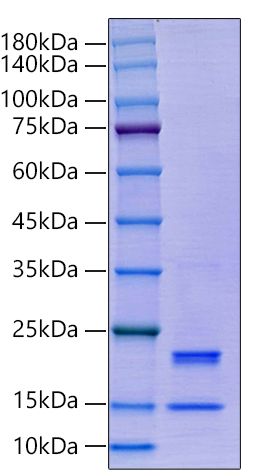Description
| Product Name: | Recombinant Human Caspase-7/CASP7 Protein |
| SKU: | RPCB0109 |
| Size: | 10µg |
| Tag: | C-His |
| Reactivity: | Human |
| Expression Host: | E. coli |
| Protein Description: | High quality, high purity and low endotoxin recombinant Recombinant Human Caspase-7/CASP7 Protein , tested reactivity inE. coliand has been validated in SDS-PAGE.100% guaranteed. |
| Endotoxin: | < 0.01 EU/μg of the protein by LAL method. |
| Purity: | > 90% by SDS-PAGE. |
| Formulation: | Lyophilized from a 0.22 μm filtered solution of PBS, pH 7.4. |
| Gene ID: | 840 |
Caspase-7/CASP7 belongs to the cysteine-aspartic acid protease (caspase) family. Caspases play a role in the signal transduction pathways of apoptosis, necrosis and inflammation. There are two major classes of caspases: initiators and effectors. The initiator isoformsare activated by, and interact with, upstream adaptor molecules through protein-protein interaction domains known as CARD and DED. Effector caspases are responsible for cleaving downstream substrates and are sometimes referred to as the executioner caspases. Caspase 7 exists in lung, skeletal muscle, liver, kidney, spleen, heart, and moderately in testis. Caspase 7 cannot be detected in the brain. Caspase 7 functions in the activation cascade of caspases responsible for apoptosis execution. It cleaves and activates sterol regulatory element binding proteins (SREBPs). It proteolytically cleaves poly(ADP-ribose) polymerase (PARP) at a '216-Asp- -Gly-217' bond. Overexpression promotes programmed cell death.
| Storage: | Store at -20℃.Store the lyophilized protein at -20℃ to -80 ℃ up to 1 year from the date of receipt.After reconstitution, the protein solution is stable at -20℃ for 3 months, at 2-8℃ for up to 1 week. |
| Reconstitution: | Centrifuge the vial before opening. Reconstitute to a concentration of 0.1-0.5 mg/mL in sterile distilled water. Avoid vortex or vigorously pipetting the protein. For long term storage, it is recommended to add a carrier protein or stablizer (e.g. 0.1% BSA, 5% HSA, 10% FBS or 5% Trehalose), and aliquot the reconstituted protein solution to minimize free-thaw cycles. |
| Swiss-Prot: | P55210-1 |







